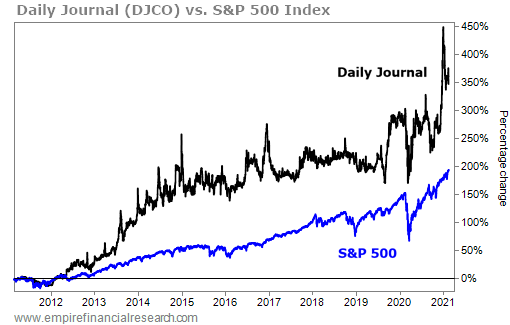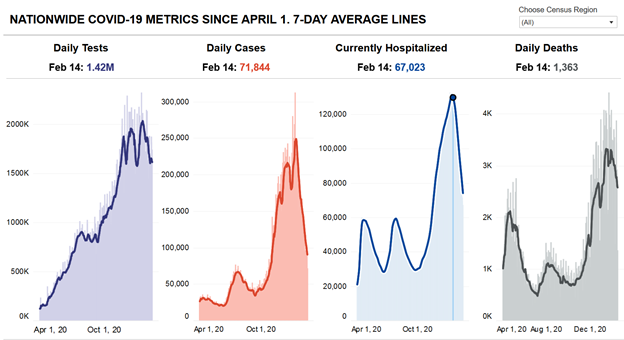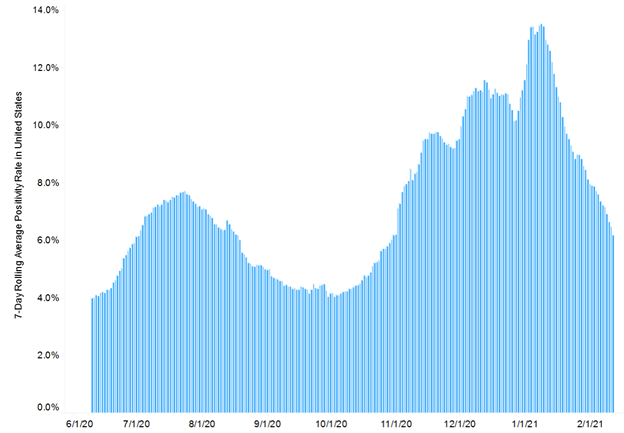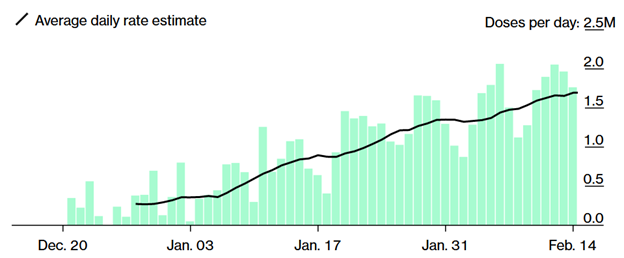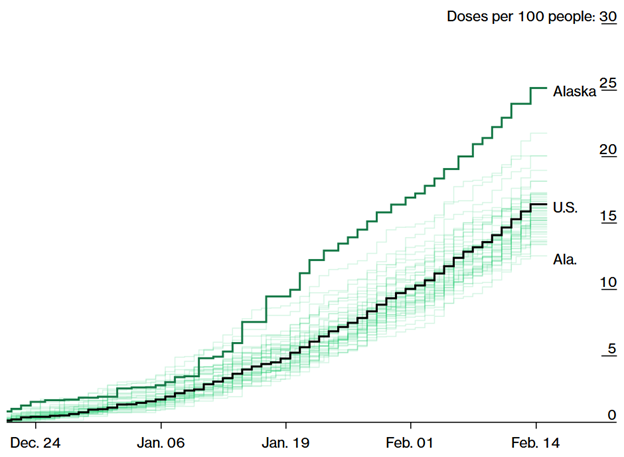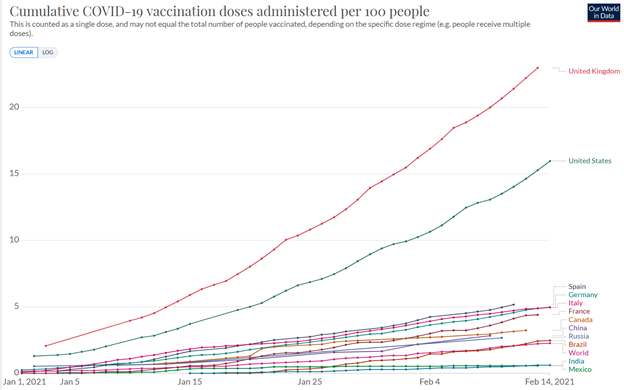Munger annual meeting livestream February 24; Daily Journal stock; Getting a vaccination appointment in NYC; U.S. pandemic dashboard
1) For more than 20 years, I've been attending the Berkshire Hathaway (BRK-B), Wesco, and Daily Journal (DJCO) meetings to hear Warren Buffett and Charlie Munger speak.
I've never once regretted making the trip. These two are so wise and unique... and I love meeting and catching up with my friends and readers.
Along with my analysts Alex Griese and Kevin DeCamp, I attended Munger's Daily Journal annual meeting in Los Angeles last February (see our notes here). But this year the meeting will be livestreamed starting at 1 p.m. Eastern time on Wednesday, February 24 on Yahoo Finance's website. Here's Julia La Roche's article about it: Yahoo Finance to stream Daily Journal annual meeting featuring Charlie Munger. Excerpt:
"We won't be able to join each other in person this year, but I hope that many shareholders will join our annual meeting online. In the meeting, Jerry and I, as usual, will answer many questions," Munger wrote in a letter to shareholders last month.
I encourage you to send in a question for Munger. To do so, the proxy statement states:
Shareholders should send their questions to Julia LaRoche, a journalist at Yahoo Finance, who will then submit questions to the Board. Please send questions by February 15, 2021 at 5:00 p.m. Pacific time to the following email address: DailyJournalQuestions@YahooFinance.com. Given time constraints, we unfortunately anticipate that not all questions will be asked and answered at the Annual Meeting.
(Julia has assured me that she will still accept questions, even though the February 15 deadline has passed.)
2) Shame on me for never looking closely at the Daily Journal's stock. As you can see in this chart, it has handily outperformed the S&P 500 Index over the past decade:
3) I continue to closely follow the pandemic, sending lengthy e-mails to my coronavirus e-mail list roughly once a week. If you'd like to receive them, simply send a blank e-mail to: cv-subscribe@mailer.kasecapital.com.
Below is an excerpt from the two e-mails I sent to my readers yesterday and this morning (you can read both e-mails here and here)...
A) I've volunteered twice in the past two weeks at a vaccination center in the South Bronx, so I've been closely following my fellow New Yorkers' efforts to get vaccinated.
I have good news and bad news.
The good news is that, as of today, a new category of people now qualify to receive the vaccine: In addition to anyone age anyone 65 or older and people holding particular jobs with high potential for COVID exposure (full list here) – a total of 7 million New Yorkers – now an additional 3 million folks with certain underlying conditions like cancer, heart conditions, and severe obesity (full list here) also qualify.
The bad news is that, even if you qualify, it can be maddeningly difficult to get an appointment to get the first shot (once you've done this, it's generally much easier to get the second shot, which is 28 days later for the Moderna vaccine, which most New Yorkers are getting).
Here are my suggestions:
If you are a resident of the Bronx, go to this website (https://nycvaccinelist.com) to see if there are appointments at Yankee Stadium. As of this writing (the morning of February 15), there are 60 available appointments on Saturday, February 20 – but only for Bronx residents.
If you're not a Bronx resident, it's going to be more difficult. Sadly, the official city websites (https://vaccinefinder.nyc.gov and https://vaccinepod.nyc.gov) are worthless – they show hundreds of vaccination sites, but when you go to each of them, after wasting your time entering all sorts of information, they tell you every appointment is booked. I've also heard the city's phone line at 1-877-VAX-4NYC is worthless as well.
Instead, go to these two sites set up by smart, good-hearted private citizens (here's an article about one of them: N.Y.'s Vaccine Websites Weren't Working. He Built a New One for $50.), which scan the official sites and show appointments as soon as they're added (which is often, so check back often):
- https://www.turbovax.info (which also posts new appointments on Twitter here: https://twitter.com/turbovax)
- https://nycvaccinelist.com
Good luck!
B) The news regarding the pandemic continues to be excellent.
Here are the latest data for testing, cases (down by 77% in the past month to 71,844 yesterday, from the peak on January 8 at 312,097), hospitalizations (down 48% from the peak), and deaths are now following, plunging rapidly (the seven-day average is down 22% in the past month) (source):
The positivity rate is also falling rapidly, down by more than half from 13.6% a month ago to 6.2% today (source):
(If you click the source links above, you can see all of these data by state, plus here are the data for New York City.)
Lastly, over the past seven days, we've averaged 1.7 million doses being administered per day (source)!
As a result, more than 10% of our population has been vaccinated (note that this chart is doses/100 people... since some people have received two doses, I estimate that roughly 12% of Americans have received at least one dose of a vaccine) (source):
We continue to be among the world leaders in vaccinating our population, trailing only the U.K. among major countries (source):
C) Let's hope this is right (I think there's a good chance of it)! The Pandemic Could Be 'Effectively' Over by April, According to JPMorgan. Excerpt:
The current trajectory of COVID-19 cases and vaccinations implies that the global pandemic could be as good as over in just a couple of months, a team of JPMorgan analysts that includes global head of quantitative and derivatives strategy Marko Kolanovic said on Friday. That's a much faster timeline than the market and most economists are working with.
The JPMorgan analysts aren't concerned about the potentially more contagious U.K. coronavirus variant, referred to as B.1.1.7., which has been discovered in dozens of countries and more than 30 U.S. states. Last month, the Centers for Disease Control and Prevention warned that the U.K. variant could become the dominant strain in the U.S. by March.
"The spread of the B.1.1.7. variant is not inconsistent with an overall decline of COVID and an end of the pandemic in Q2 due to vaccination, natural immunity, seasonality, and other factors," Kolanovic wrote on Friday. "... While the dataset is still small, statistical analysis of current vaccination data is consistent with a strong decline (i.e. effective end) of the pandemic within ~40-70 days."
In the rest of my e-mails, which you can read by clicking here and here, I cover:
- The one crucial vaccine trial result that could end our COVID nightmare
- CDC Presses K-12 Schools to Reopen
- Help! I'm Vaccinated, but What Do I Need to Know to Protect Others?
- China's COVID Secrets
- Symptomatic Covid-19 Cases Dropped 94% With Pfizer Vaccine, Israeli Data Show
- Coronavirus cases drop at US homes for elderly and infirm
- Is this finally proof the vaccine is working in Britain? COVID deaths among over-85s plummet by 41% – almost twice as fast as un-vaccinated people over-65s
- Mass General Confronts Vaccine Racial Inequity Rooted in History
- Racial disparities seen in New York City vaccination rates
- My mother and her friends couldn't get coronavirus vaccine appointments, so they turned to a stranger for help. He's 13
- N.Y.'s Vaccine Websites Weren't Working. He Built a New One for $50.
- How effective is a single vaccine dose against Covid-19?
- The Second COVID-19 Shot Is a Rude Reawakening for Immune Cells
Best regards,
Whitney
